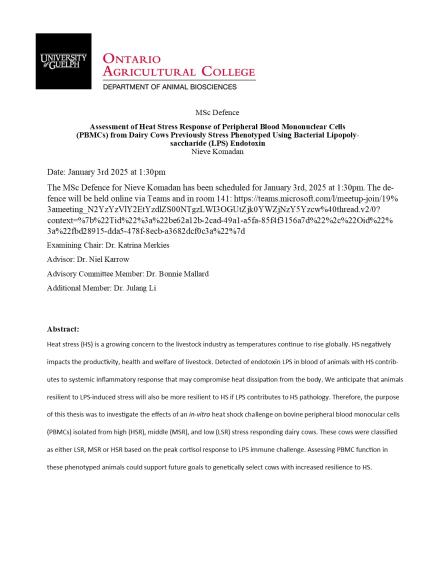Room 141 and Teams: https://teams.microsoft.com/l/meetup-join/19%3ameeting_N2YzYzVlY2EtYzdlZS00NTgzLWI3OGUtZjk0YWZjNzY5Yzcw%40thread.v2/0?context=%7b%22Tid%22%3a%22be62a12b-2cad-49a1-a5fa-85f4f3156a7d%22%2c%22Oid%22%3a%22fbd28915-dda5-478f-8ecb-a3682dcf0c3a%22%7d

Assessment of Heat Stress Response of Peripheral Blood Mononuclear Cells (PBMCs) from Dairy Cows Previously Stress Phenotyped Using Bacterial Lipopoly-saccharide (LPS) Endotoxin
Heat stress (HS) is a growing concern to the livestock industry as temperatures continue to rise globally. HS negatively impacts the productivity, health and welfare of livestock. Detected of endotoxin LPS in blood of animals with HS contrib-utes to systemic inflammatory response that may compromise heat dissipation from the body. We anticipate that animals resilient to LPS-induced stress will also be more resilient to HS if LPS contributes to HS pathology. Therefore, the purpose of this thesis was to investigate the effects of an in-vitro heat shock challenge on bovine peripheral blood monocular cells (PBMCs) isolated from high (HSR), middle (MSR), and low (LSR) stress responding dairy cows. These cows were classified as either LSR, MSR or HSR based on the peak cortisol response to LPS immune challenge. Assessing PBMC function in these phenotyped animals could support future goals to genetically select cows with increased resilience to HS.

